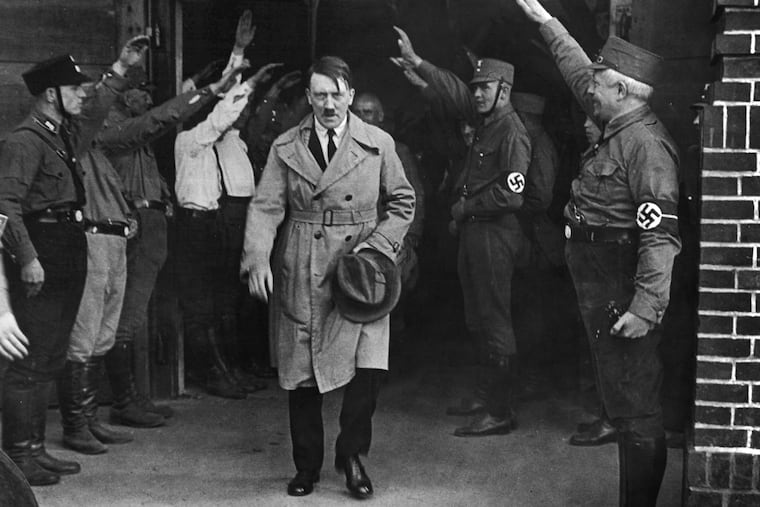Is it wrong to compare Trump to Hitler? No. | Opinion
As a son of Holocaust survivors, I might be expected to find it offensive to use the Holocaust as a yardstick for the political turmoil caused by Trump. But I don't.

Many people find it offensive to use the Holocaust as a yardstick for the political excesses of the last four years that culminated in the storming of Washington on Jan. 6. They believe that to mention Donald Trump and Adolf Hitler in the same breath, as Spike Lee did on Sunday in an awards speech, disrespects the millions of innocent victims and survivors, diminishing the enormity of the Nazis’ crimes.
As a son of Holocaust survivors and a grandson of four murdered Jews, I might be expected to agree. But I do not.
I think Trump’s ability to incite followers under the banner of white nationalism has enabled us to better understand Hitler’s sway over the Germans, connecting us to the real people in the old black-and-white photo images and newsreels that show the masses with arms outstretched toward their führer.
Hitler blamed the Jews for Germany’s economic woes; the gas chambers and ovens followed. Trump blamed immigrants for making us unsafe; child migrants in cages, Muslims banned from entering the U.S., and a new wall on our Mexican border followed. Trump figuratively drove busloads of angry Americans to Washington this month and egged them on after they got there.
» READ MORE: Holocaust Remembrance Day touches on past and present
Now we have seen in our nation’s capital — indeed, in our Capitol — how Kristallnacht could have happened; and ultimately how men and women could devise what my father, George Preston, an engineer who survived Auschwitz and Buchenwald, called an “Industry of Death.” Now we have a way to understand the rise of a fascist dictator and the blind allegiance of murderous minions.
Are my fellow Americans who breached the barricades and broke into the halls of Congress different from the Germans who thought they were doing their patriotic duty by burning synagogues and shattering Jewish-owned shops in 1938?
“By defending myself against the Jew, I am fighting for the work of the Lord,” Hitler wrote in 1925 in Mein Kampf, adding that “in the big lie there is always a certain force of credibility.”
Trump, years before the 2016 Republican convention nominated him for president, similarly signaled that his racism was not burdened by facts. In 1989, after the rape of a jogger in Central Park, he took out ads in New York newspapers calling for his state to adopt the death penalty. In that atmosphere of fear, five black and Latino teens were wrongly convicted and sentenced to prison.
In 2011, Trump embraced the debunked “birther” conspiracy theory surrounding President Barack Obama. Throughout the GOP primaries, Trump retweeted messages from neo-Nazi accounts and refused to disavow the support of former Ku Klux Klan grand wizard David Duke. This month, he professed love for the participants during the D.C. riot.
This is not to suggest that Trump would have become another Hitler, or that Trumpism is equatable to Nazism. But we now have a clearer understanding of the darker side of human nature.
Wednesday, Jan. 27, is International Holocaust Remembrance Day. My mother, Halina Wind Preston, who hid from the Nazis in the sewers of Lviv for 14 months in 1943-44, devoted her postwar life in Delaware to teaching the lessons of the Holocaust.
» READ MORE: Holocaust survivor Anneliese Nossbaum returned to Auschwitz for a final reckoning.
She lobbied tirelessly for Holocaust studies in the schools, a mission fulfilled last July when Gov. John Carney signed into law a bill requiring students to receive such lessons — which will be partially provided by the Halina Wind Preston Holocaust Education Committee of the Jewish Federation of Delaware.
My mother’s vision was not consigned exclusively to the classroom. She established the Garden of the Righteous Gentiles in front of Wilmington’s Jewish Community Center, the nation’s first monument to Christians who rescued Jews — including trees planted for the two Polish Catholic sewer workers who had saved her life.
To learn lessons from the Holocaust means to recognize the seeds of hatred before they sprout in the streets of Charlottesville or in the halls of power in Washington, and instead to plant seeds of understanding and love.
On Dec. 2, 1979, precisely three years before her death, my mother dedicated a stone-and-iron Holocaust monument in downtown Wilmington, saying it should “alert new generations to be ever vigilant not to take the country’s freedoms for granted, because governments can be overthrown and constitutions rewritten.”
Is it sacrilegious to suggest a link between Hitler and Trump?
I don’t think so. I’d say it keeps us vigilant for the warning signs.
David Lee Preston is a retired Inquirer editor. Learn more about his parents at www.davidleepreston.com.